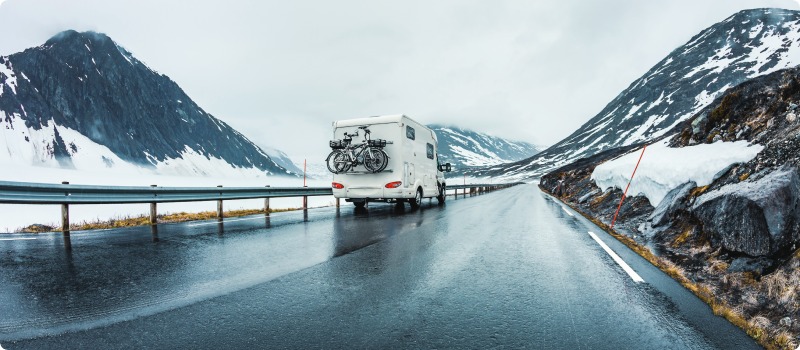DetailsPageWrapperHero
JSS component is missing React implementation. See the developer console for more information.
DetailsPageWrapperContent
JSS component is missing React implementation. See the developer console for more information.
As you wrap up your summer adventures, you’ll want to consider all that goes into winterizing your recreational vehicle. Winterizing your camper or RV not only saves it from damage — it makes it easier to get started next season! If you decide to do this work yourself, you’ll avoid paying an RV garage, and you’ll have a pretty good idea of what it takes to de-winterize your RV in the spring.
Whether you’ve got a big rig, trailer, fifth wheel or anywhere in between, take a look at these tips to get your ride ready for its winter hibernation.
What does it mean to winterize an RV?
Freezing temperatures can take their toll on more than just your rig’s water lines. Winterizing is primarily about keeping your water lines from freezing by flushing them and then adding antifreeze in certain places. As you’ll see, there’s really more to it than that.
DetailsPageWrapperContent
JSS component is missing React implementation. See the developer console for more information.
Prepping your RV’s tires for winter
Taking care of your RV tires during the winter months is just as important as attending to them out on the road. Follow your owner’s manual for off-season tire care. Here’s our advice on managing your tires:
- Park the RV on concrete if possible
- Set the parking brake
- Set wheel chocks
- Engage the leveling jacks (not stabilizing jacks) to prevent the tires from developing flat spots
- Use external jacks to lift the RV
- You can also just move the RV half a tire rotation two or three times over its winter break
- Lower the stabilizing jacks enough to keep the RV steady while you’re inside it, but it shouldn’t be taking on any load
- Spray the RV with UV protecting conditioner
- Cover the tires for the winter
Managing propane sources and fittings
Propane can expand and contract when the temperature changes and that can lead to leaks and problems next year. Here are a few things to do to help keep your propane tanks working well:
- Refill all propane tanks
- In freezing climates, remove external propane tanks and safely store in a protected and warm place — but not in the RV
- Protect propane fittings with plastic bags and rubber bands
- Replace any hoses or fittings that are showing signs of cracking or wear
Take on spring cleaning before winterizing
Much like vacation homes, you should unplug, clean the refrigerator and leave the door open during storage to prevent mold and mildew. Remove any food items, toiletries and medicines. Spend a little time wiping down and cleaning up your RV before you put it to bed for the winter:
- Vacuum all floors and carpets
- Spray down and wipe all surfaces
- Remove all bedding, clothes and linens for laundering
- Place cans of dry-packs silica around the RV

Winterizing your RV’s exterior, roof and awning
Protecting your RV from harsh winter weather can add years to its life. These tips can help you keep your RV’s awning and everything else in great shape while it’s in storage:
- House your RV under a shelter
- Cover the RV with a breathable tarp
- Place a waterproof tarp on the surface where the RV will rest
- Extend the awning fully and wash it according the manufacturer’s directions, rolling it back up after it’s completely dry
- Apply a slip-on awning cover (rigid, if possible) to protect it from the elements
- Close every roof vent and plug other vents open to the air with steel wool or aluminum
- Apply silicon caulk to the exterior where small cracks have developed
- Cover the AC unit
- Clean the sewer hose and store it
It may seem like a lot to do but with a little work, you can add years of enjoyment to your RV or camper. And before you know it — it’ll be time for another season of adventures!
As you’re giving your RV some TLC this fall, remember to check in with your American Family Insurance agent and review your RV coverage options. With a well-crafted policy and a solid winterization strategy, your RV can be protected from the elements and the unexpected — taking you onto the open road well into the future.
This article is for informational purposes only and based on information that is widely available. We do not make any guarantees or promise any results based on this information.
Tools & Resources
NextScripts
JSS component is missing React implementation. See the developer console for more information.
